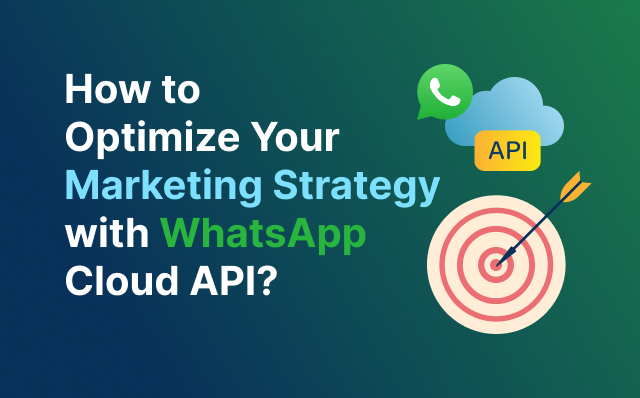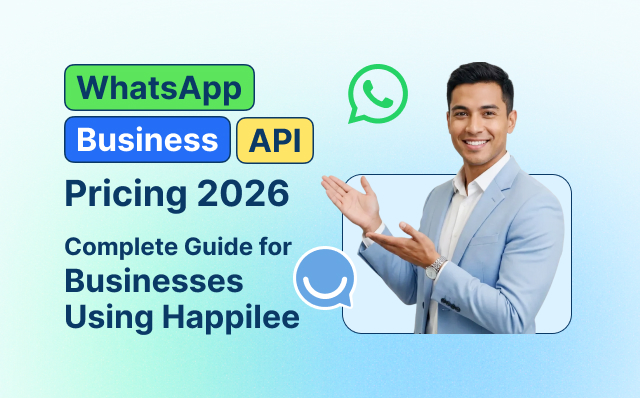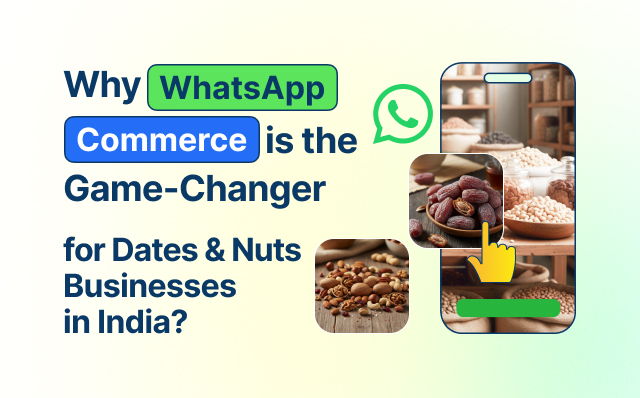In today’s digital age, effective communication channels are essential for businesses looking to connect with their audience. WhatsApp has become a vital tool in this regard, boasting over 2 billion active users worldwide. Leveraging WhatsApp for marketing can significantly enhance your customer engagement and retention.
This guide will explore how to optimize your marketing strategy with WhatsApp Cloud API, focusing on the keyword WhatsApp marketing strategy.
Understanding WhatsApp Cloud API
WhatsApp Cloud API provides businesses with the tools to send messages, notifications, and automated responses to their customers. Unlike the standard WhatsApp Business App, the Cloud API offers greater flexibility and integration capabilities, making it ideal for businesses of all sizes.
With WhatsApp Cloud API, businesses can integrate their existing systems, such as CRM or ERP, to streamline communication processes. This integration enables more efficient handling of customer interactions, ensuring that messages are timely and relevant.
Key Features of WhatsApp Cloud API
- Scalability: The Cloud API is designed to handle high volumes of messages, making it suitable for both small businesses and large enterprises. It allows businesses to manage thousands of customer interactions simultaneously without compromising on speed or efficiency.
- Flexibility: Businesses can customize their messaging workflows to suit their specific needs. This includes setting up automated responses, creating personalized message templates, and integrating with other business tools.
- Integration Capabilities: One of the most significant advantages of the WhatsApp Cloud API is its ability to integrate seamlessly with existing business systems. This includes:
- Customer Relationship Management (CRM) Systems: By integrating WhatsApp Cloud API with CRM systems, businesses can maintain a comprehensive record of customer interactions. This integration helps in delivering personalized experiences based on customer history and preferences.
- Enterprise Resource Planning (ERP) Systems: Integration with ERP systems allows for efficient management of operations such as order processing, inventory management, and supply chain logistics. For instance, businesses can send automated order confirmations and shipping notifications directly through WhatsApp.
- Marketing Automation Platforms: Businesses can synchronize their marketing campaigns across different channels, ensuring that WhatsApp messages complement email, SMS, and social media marketing efforts.
- Enhanced Customer Support: The API supports the integration of advanced customer support tools, such as chatbots and automated ticketing systems. This ensures that customers receive timely and relevant responses, improving overall satisfaction.
- Real-time Communication: WhatsApp Cloud API enables real-time communication, allowing businesses to engage with their customers instantly. This is particularly beneficial for time-sensitive interactions such as order updates, appointment reminders, and customer support inquiries.
- Security and Compliance: WhatsApp Cloud API adheres to strict security protocols to protect customer data. End-to-end encryption ensures that messages are secure and only accessible by the intended recipients. Additionally, businesses must comply with WhatsApp’s policies and regulations, including obtaining customer consent for messaging.
Benefits of Using WhatsApp Cloud API for Marketing
Direct Communication
Engaging with customers in real-time is one of the most significant advantages of using WhatsApp Cloud API. This direct communication channel allows businesses to provide instant responses to customer queries, which is crucial in today’s fast-paced environment where customers expect quick and efficient service.
- Instant Customer Support: Customers can reach out with questions or issues and receive immediate assistance, reducing wait times and frustration. This can be particularly beneficial for addressing urgent matters or providing timely information.
- Proactive Engagement: Businesses can also initiate conversations with customers, such as sending follow-up messages after a purchase or reaching out to gather feedback. This proactive approach can help in identifying potential issues before they escalate and showing customers that their input is valued.
- Building Trust: Regular and responsive communication helps build a stronger relationship with customers. When customers know they can rely on quick and helpful responses, their trust in the business increases, leading to higher satisfaction and loyalty.
Personalized Messaging
Personalization is a key factor in effective marketing, and WhatsApp Cloud API allows businesses to tailor their messages to individual customers based on their preferences and behavior.
- Customer Segmentation: By segmenting your audience based on criteria such as purchase history, demographics, and engagement levels, you can send highly relevant messages to each group. For example, you can send special offers to frequent buyers or recommend products based on previous purchases.
- Dynamic Content: Use customer data to create dynamic message content that addresses each customer’s unique interests and needs. Personalized greetings, product recommendations, and exclusive offers can make customers feel special and appreciated.
- Increased Engagement: Personalized messages are more likely to capture the recipient’s attention and encourage interaction. When customers see that messages are relevant to their interests, they are more inclined to respond positively and take the desired action.
Automation
Automation streamlines communication processes, allowing businesses to handle routine tasks efficiently and consistently.
- Welcome Messages: Automatically send a warm welcome message to new customers or subscribers, setting a positive tone for future interactions. This can include a brief introduction to your business and links to helpful resources or products.
- Order Confirmations: Send automated order confirmation messages as soon as a purchase is made, providing customers with peace of mind and important order details. This can include estimated delivery times and tracking information.
- Reminders and Notifications: Use automation to send timely reminders for appointments, subscription renewals, or special promotions. Automated reminders help ensure that customers do not miss important events and can encourage repeat business.
- Consistency: Automation ensures that every customer receives the same high level of service, regardless of when they interact with your business. This consistency helps maintain a positive brand image and reduces the risk of human error.
Analytics
The ability to track and analyze the performance of your WhatsApp marketing campaigns is essential for continuous improvement and effectiveness.
- Performance Metrics: Analyze key metrics such as open rates, response times, click-through rates, and conversion rates. These metrics provide valuable insights into how customers are interacting with your messages and which strategies are most effective.
- Customer Insights: Gain a deeper understanding of customer behavior by analyzing their interactions with your messages. This can help identify patterns, preferences, and pain points, allowing you to tailor your approach to better meet their needs.
- Campaign Refinement: Use analytics to assess the success of different campaigns and identify areas for improvement. A/B testing different message formats, content, and timings can help determine the most effective strategies.
- ROI Measurement: Track the return on investment (ROI) of your WhatsApp marketing efforts by comparing the costs of the campaigns to the revenue generated. This helps justify marketing expenditures and allocate resources more effectively.
Steps to Optimize Your WhatsApp Marketing Strategy
Optimizing your WhatsApp marketing strategy involves a series of deliberate steps designed to maximize customer engagement, enhance user experience, and achieve specific business objectives. Here’s an in-depth look at how you can accomplish this:
1. Set Clear Objectives
Defining clear objectives is crucial for a focused and effective WhatsApp marketing strategy. Setting goals helps you align your efforts and measure your success effectively.
- Increase Sales: If your primary aim is to boost sales, direct your strategy towards sending well-timed promotional messages, offering exclusive discounts, and notifying customers about new product launches. By crafting compelling offers and ensuring they reach the right audience, you can drive more conversions and increase revenue.
- Enhance Customer Support: To elevate your customer service, leverage WhatsApp to automate responses for frequently asked questions, provide real-time support through chat, and ensure prompt issue resolution. Efficient customer support through WhatsApp can enhance satisfaction and foster loyalty.
- Boost Brand Awareness: Utilize WhatsApp to share engaging content, run creative campaigns, and encourage customers to share their experiences with your brand on social media. By consistently delivering value and sparking conversations, you can amplify your brand’s presence and reputation.
2. Segment Your Audience
Audience segmentation allows you to tailor your messages for different groups, enhancing the relevance and effectiveness of your marketing efforts.
- Demographic Segmentation: Group your customers based on factors such as age, gender, location, and income. This approach enables you to craft messages that resonate with each demographic, making your marketing efforts more impactful.
- Behavioral Segmentation: Divide your audience based on their purchase history, interaction levels, and engagement with your brand. For instance, create segments for new customers, repeat buyers, and those who haven’t interacted with your brand recently. This allows for more targeted and relevant messaging.
- Psychographic Segmentation: Analyze customers’ interests, values, and lifestyles to personalize your messages further. Tailoring content to match their preferences and motivations ensures that your communications are more engaging and effective.
3. Personalize Your Messages
Personalized communication not only increases engagement but also builds a stronger connection with your audience, fostering customer loyalty.
- Use Names: Personalize messages by addressing customers by their names. This simple yet effective strategy makes customers feel valued and acknowledged, increasing the likelihood of positive responses.
- Tailor Content: Customize your messages based on customer preferences and previous interactions. For example, recommend products similar to those they have purchased or shown interest in, making your offers more relevant.
- Send Relevant Offers: Provide special discounts and promotions tailored to each customer segment’s needs and interests. Personalized offers enhance the perceived value and relevance, driving higher engagement and conversion rates.
4. Leverage Automation
Automation streamlines your communication processes, saving time and ensuring consistency while providing a seamless experience for your customers.
- Automated Responses: Set up automated replies for common questions regarding store hours, return policies, and product availability. Automation helps in delivering instant responses, improving customer satisfaction.
- Order Confirmations and Updates: Automatically send order confirmations, shipping notifications, and delivery updates. This keeps customers informed and enhances their overall shopping experience.
- Appointment Reminders: Utilize automation to send timely reminders for appointments, reservations, or events. This reduces no-shows and helps maintain a well-organized schedule, benefiting both your business and your customers.
5. Create Engaging Content
Engaging content captures your audience’s attention and encourages them to interact with your brand, leading to higher engagement and customer retention.
- Product Updates: Keep your customers informed about new products, restocks, and upcoming launches. Regular updates maintain interest and ensure customers are aware of the latest offerings.
- Special Offers: Promote exclusive deals, discounts, and limited-time offers to create urgency and drive sales. Highlighting time-sensitive promotions can stimulate immediate action.
- Helpful Tips: Share valuable information such as how-to guides, usage tips, and best practices related to your products or services. Providing useful content establishes your brand as a helpful resource.
- Multimedia Elements: Incorporate images, videos, and links to make your messages more interactive and visually appealing. Rich media enhances engagement and makes your communications more dynamic.
6. Utilize Broadcast Lists and Groups
Effectively using broadcast lists and groups can enhance your communication efforts, allowing for broader and more targeted interactions.
- Broadcast Lists: Employ broadcast lists for one-to-many communication, such as sending announcements, updates, and promotional messages. This approach ensures that your message reaches multiple customers at once without disclosing the recipients.
- Groups: Create groups for focused discussions and community building. Use groups to foster a sense of belonging among your customers, encouraging them to share feedback, ask questions, and interact with your brand and other customers.
7. Monitor and Analyze Performance
Tracking and analyzing the performance of your campaigns is crucial for continuous improvement and optimizing your strategy.
- Key Metrics: Monitor key performance indicators such as open rates, response times, click-through rates, and conversion rates. These metrics provide insights into how well your messages are performing.
- Customer Insights: Analyze customer interactions to gain a deeper understanding of their behavior, preferences, and pain points. This data helps in refining your strategy and making your messages more effective.
- Campaign Refinement: Use performance insights to improve future campaigns. A/B test different message formats, content types, and sending times to determine what resonates best with your audience.
8. Ensure Compliance
Maintaining compliance with WhatsApp’s business policies and guidelines is essential for building trust and ensuring a positive customer experience.
- Obtain Consent: Ensure that you have explicit permission from customers before sending them messages. Use opt-in forms, subscription requests, or clear terms of service to obtain consent.
- Provide Opt-out Options: Always include an option for customers to opt out of receiving messages. This respects their preferences and helps maintain a clean, engaged contact list.
- Follow Guidelines: Stay updated with WhatsApp’s policies and guidelines to ensure compliance. Avoid spammy behavior, respect user privacy, and secure customer data to maintain a trustworthy relationship with your audience.
Types of WhatsApp Marketing Messages
Effective WhatsApp marketing messages can enhance customer engagement and drive business goals. Here’s a look at some common types of messages you can use, along with examples for each:
1. Welcome Message
A welcome message is your first opportunity to make a positive impression on new customers or subscribers. It sets the tone for your relationship and invites them to explore your offerings.
Example: “Hi [Customer Name], welcome to [Your Business Name]! We’re excited to have you on board. How can we assist you today?”
2. Product Update
Product update messages are designed to inform your customers about new arrivals or updates to existing products. These messages help keep your audience engaged and interested in your latest offerings.
Example: “Hello [Customer Name], check out our new arrivals! Click here to explore: [Link]”
3. Special Offer
Special offer messages are aimed at promoting discounts, deals, or exclusive offers. These messages can drive sales by encouraging customers to take advantage of limited-time promotions.
Example: “Hi [Customer Name], enjoy a 20% discount on your next purchase with code SAVE20. Offer valid until [Date].”
4. Appointment Reminder
Appointment reminder messages help ensure that customers remember their scheduled appointments, reducing the risk of no-shows. They typically include essential details and a call to action to confirm attendance.
Example: “Dear [Customer Name], this is a reminder for your appointment on [Date] at [Time]. Please reply ‘Confirm’ to confirm your attendance.”
Conclusion
Optimizing your WhatsApp marketing strategy with the Cloud API can significantly enhance how you interact with your customers. By leveraging the advanced features of WhatsApp Cloud API, such as real-time messaging, automated responses, and integration with existing systems, you can streamline your communication processes and deliver a more personalized experience. Setting clear objectives ensures that your marketing efforts are focused and measurable, while segmenting your audience and personalizing messages helps in creating relevant and engaging content.
Automation plays a crucial role in managing routine tasks efficiently, allowing you to maintain consistent and timely communication without manual intervention. By continuously monitoring and analyzing performance metrics, you can gain valuable insights into customer behavior and campaign effectiveness, which can be used to refine your strategy and improve results.
Embracing the full potential of WhatsApp Cloud API not only enhances customer engagement but also contributes to overall business growth. As you implement these practices, you will find that your marketing efforts become more effective and impactful, driving better outcomes and helping you achieve your business goals.
For businesses looking to leverage WhatsApp Cloud API, providers like Happilee offer robust solutions that can support your marketing strategy and ensure seamless integration with your business processes. Explore what Happilee has to offer and elevate your WhatsApp marketing WhatsApp marketing strategy to new heights.


